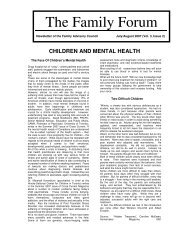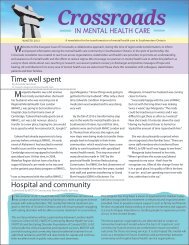Summer 2009 - St. Joseph's Health Care London
Summer 2009 - St. Joseph's Health Care London
Summer 2009 - St. Joseph's Health Care London
Create successful ePaper yourself
Turn your PDF publications into a flip-book with our unique Google optimized e-Paper software.
struggling with mental health challenges related<br />
to military service.”<br />
❋ it takes teamwork<br />
The OSI clinic, funded by Veterans Affairs<br />
Canada, is a specialized mental health service<br />
for veterans, members of the Canadian Forces,<br />
and eligible members of the RCMP encountering<br />
ongoing difficulties as a result of military<br />
service-related psychological injury and traumatic<br />
events. A multidisciplinary team of psychiatrists,<br />
psychologists, nurses and clinical<br />
social workers provides assessment, treatment<br />
and prevention for those suffering from servicerelated<br />
PTSD, anxiety, depression or addiction.<br />
Psychological injuries are not unique to combat<br />
veterans—peacekeepers are also exposed to<br />
traumatic events that they are helpless to prevent<br />
under the United Nations rules of engagement.<br />
These rules state soldiers must show restraint<br />
and neutrality. The feeling of being unable to<br />
control a situation at the time of trauma is an<br />
important factor for developing OSIs.<br />
Clinical nurse specialist Nancy Cameron says,<br />
“It is a humbling experience to enter into a client’s<br />
story of military trauma. It is challenging and<br />
highly fulfilling work.”<br />
❋ pioneering the OSI approach<br />
In 2002, Parkwood’s OSI clinic became only the<br />
second such clinic to open in Canada. Together<br />
with the clinic in Montreal, they paved the way<br />
in establishing treatment processes and clinics<br />
across Canada. “It’s unique to have a network of<br />
mental health services that span the country,”<br />
says Rita Wiltsie, OSI clinic coordinator. “We<br />
are always refining our services to better serve<br />
our clients. We’ve come a long way in a few<br />
short years.”<br />
The Parkwood OSI clinic is now part of a<br />
national network of six treatment clinics—with<br />
the closest located in Ottawa. To make access<br />
easier, the Parkwood clinic conducts an outreach<br />
program in the Grey-Bruce region and works<br />
collaboratively with the Land Force Central Area<br />
Training Centre in Meaford. Plans are under way<br />
to open a satellite clinic in Guelph this year.<br />
“As a joint network, we work collaboratively<br />
with other military service providers, sharing<br />
knowledge and expertise in military trauma,”<br />
says Wiltsie. “Our aim is to provide expert mental<br />
health services to those who have experienced<br />
trauma during their military experience.”<br />
❋ reaching out<br />
A 30 per cent increase in Parkwood’s OSI clinic<br />
clients in 2008 over 2007 illustrates a growing<br />
need for the services. To enhance the program,<br />
the clinic recently added education groups for<br />
clients and their families that explore topics such<br />
as PTSD, grief and loss, and anger management.<br />
The clinic is also working with the Department<br />
of National Defence to increase services for current<br />
Canadian Forces members.<br />
While the primary goal of the OSI clinic is to<br />
manage psychological injuries, pervasive pain<br />
from physical injuries also takes an emotional<br />
toll. To help clients manage physical pain, the<br />
clinic will be hosting a workshop this year featuring<br />
experts in the field of pain management.<br />
The clinic also offers its services to the veterans<br />
at Parkwood receiving long-term care. Both<br />
residents and staff can participate in education<br />
sessions on OSIs and learn strategies to address<br />
these injuries.<br />
❋ helping each other<br />
A key component of recovery from<br />
OSI is support from peers. The OSI<br />
social support group is a network of<br />
peers who support OSI clinic clients<br />
including older veterans, younger<br />
veterans and current Canadian<br />
Forces members. “The peer support<br />
group is an integral part of our clinic<br />
and a vital link for our clients,”<br />
says Wiltsie. “Having lived through<br />
many of the situations our clients<br />
experience, their caring helps our<br />
clients feel more comfortable.”<br />
Through its extensive services,<br />
the OSI clinic is providing welcome<br />
relief from the emotional scars that<br />
linger in the minds of some members<br />
of the military. And it’s helping people like<br />
Bill Findley rediscover their lives.<br />
“Through the specialized treatment I’ve<br />
received,” he says, “I am finally able to live<br />
my life as I want—not always hiding behind a<br />
closed door.”<br />
Bill Findley’s traumatic experiences as<br />
a young soldier would stay with him<br />
for decades.<br />
vim & vigour • summer <strong>2009</strong> 5










